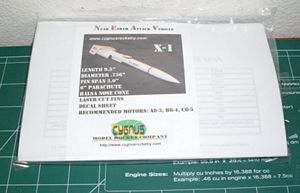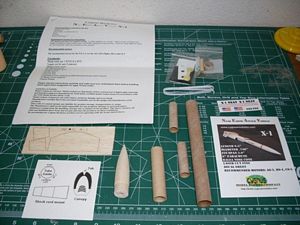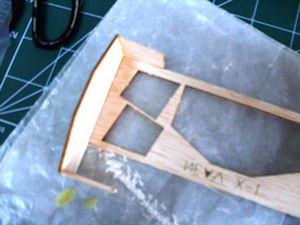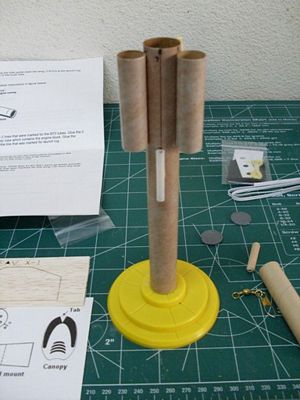Cygnus Rocketry Near Earth Attack Vehicle (N.E.A.V.)
Cygnus Rocketry - Near Earth Attack Vehicle (N.E.A.V.) {Kit}
Contributed by Ron Wirth
| Construction Rating: | starstarstarstar_borderstar_border |
| Flight Rating: | starstarstar_borderstar_borderstar_border |
| Overall Rating: | starstarstarstar_borderstar_border |
| Manufacturer: | Cygnus Rocketry  |

Brief:
The N.E.A.V. X-1 from Cygnus Model Rocketry Company is a small futuristic design that reminds me of something that
you might see in the pod races from the film Star Wars Episode I: The Phantom Menace. I was not familiar with
the company when I came across the rocket kit at Uncle Mike's Rocket Shack and decided to add it to my order. The
rocket kit comes in a large plastic bag with a color cover sheet and instructions printed on 8.5" by 11"
paper. It would appear from the Cygnus web site that you can only get the kit through one of their authorized
retailers. On a side note, if you are looking for prompt and reliable service for ordering rocket kits with prices that
are sometimes lower than the vendor's price, give Uncle Mike's Rocket Shack a try.
Construction:
The parts in my kit matched what was described in the previous review by Nicholas Berring. The quality of all the
items in the kit was actually very good. The parachute material is made from a thicker plastic material than what I am
typically used to getting in LPR kits. Because of the rocket's size and tight space for packing the chute, I think that
a Mylar parachute would be a better option.


 This kit was selected by my neighbor's kids to build as one of the 11 rockets in 11 weeks for
the Elevate Eleven contest here on EMRR. There is no skill reference listed for this kit that I could find but I would
rate at a skill level 2 out of 5. I ended up doing almost all of the construction on this one because of the
complexity.
This kit was selected by my neighbor's kids to build as one of the 11 rockets in 11 weeks for
the Elevate Eleven contest here on EMRR. There is no skill reference listed for this kit that I could find but I would
rate at a skill level 2 out of 5. I ended up doing almost all of the construction on this one because of the
complexity.
The instructions use diagrams rather than pictures to help you through the construction process which I prefer. Nevertheless, there are some steps that I found to be confusing. The N.E.A.V. X-1 uses a cardstock guide that you set the main body tube on to mark the placement of tube fins, balsa wing, and launch lug. I prefer a body wrap for making these markings. Since there was no guide to help square the downward wind tips to the wing, I used a corner of the balsa sheet to get them at a 90 degree angle.
 I choose to follow the instructions for adding the nose weight to the rocket rather than the suggested
method from the previous reviewer. Save yourself some time and headaches and do what Nicholas suggests. The
instructions have you glue the dowel into the nose cone, then glue the two lead disks to the nose cone. After that, you
are supposed to screw the eye hook into the lead. When I did that, the lead disk came apart and off the nose cone. So I
re-glued the whole assembly together with the screw eye already installed and plenty of glue. I needed to shave and
file the disks once everything was dry to get the nose cone into the body tube.
I choose to follow the instructions for adding the nose weight to the rocket rather than the suggested
method from the previous reviewer. Save yourself some time and headaches and do what Nicholas suggests. The
instructions have you glue the dowel into the nose cone, then glue the two lead disks to the nose cone. After that, you
are supposed to screw the eye hook into the lead. When I did that, the lead disk came apart and off the nose cone. So I
re-glued the whole assembly together with the screw eye already installed and plenty of glue. I needed to shave and
file the disks once everything was dry to get the nose cone into the body tube.
Finishing:
I applied a thin coat of Elmer's Carpenter's Wood Filler to the nose cone and balsa wing. The spiral in the body tube
was not noticeable so I chose not to fill it. I sprayed a couple coats of white primer and then a couple coats of white
gloss to the rocket. Once the paint had dried, I cut out the cardstock canopy and attached it to the rocket. The decals
are very small and do require some type of coating before you apply them. I found this out the hard way when I started
with one of the small American flags for the side wings and mangled it pretty good. I had a hard time make the decals
stick to the rocket. Overall I believe that the rocket still looks pretty cool when finished even if the completed
rocket only measures 9-½ inches in length.
Construction Rating: 3 out of 5
Flight:
Since this rocket does not have an engine clip, you need to friction fit the motor into the body tube with a piece of
masking tape around the engine. For the first flight I loaded an A8-3 into the N.E.A.V. X-1. Even though there was no
wind, I was on a smaller field and didn't want to lose the rocket. The rocket soared off the pad with a slight veer to
the left. I could not tell which way the rocket was pointing when the parachute ejected from the body. There was a wing
tip that had broken during flight. This will be an easy repair before the next flight rocket but I am going to use
white glue instead of CA for hopefully a stronger joint.
Recovery:
The recovery system for this rocket uses about 17 inches of elastic cord that is glued the inner body tube using the
tri-fold paper mount method. Even though the rocket uses only a 6" parachute, it is a tight fit to pack everything
into the BT-20 rocket. I am not sure if the chute tangle or just failed to work because of its size, but the rocket
came crashing back to the ground almost like it was in a free fall. I could see the black chute flapping in the fall
but it did little to slow it down. This might have been part of the reason that one of the wind tips was broken off at
the landing site.
Flight Rating: 2 out of 5
Summary:
The N.E.A.V.X-1 sure does look cool but I was not that impressed with the flight and recovery of the rocket. Once the
rocket is repaired I will try and launch again with a larger motor on a larger field. I am planning to replace the
6" plastic parachute with a larger Mylar one. Hopefully this will change my mind on how I feel about the rocket.
PROs: Great looks (the 5 year old neighbor wants to trade a 3FNC rocket for it), interesting tube and fin design, relatively low cost.
CONs: Construction issues, decals were hard to work with, flight and recovery problems.
Overall Rating: 3 out of 5
Other Reviews
- Cygnus Rocketry Near Earth Attack Vehicle (N.E.A.V.) By Nicholas Berring (August 19, 2008)
Brief: This is a clone of Model Rocket Newsletter plan of the month called the "Top Secret". Single-stage combination wing/fin and tube stabilization. Construction: Contents: 1 BT-20 body tube, 2 BT-5 "engine tubes", balsa nose cone, fishing swivel, screw eye, 6" parachute and thread shrouds, 17" long (before installation) 1/8" elastic ...
 |
 |
 |
 |
T.P. (September 16, 2009)